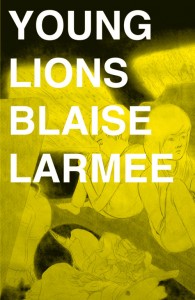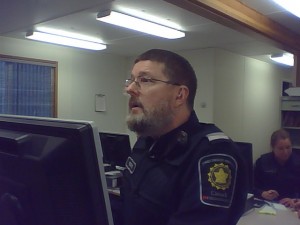Before I begin, I know that this should go without saying (given that this is a comic book website), but I’m going to make it explicit: this discussion concerns comic art and censorship.
 On their way to TCAF, Tom Neely and Dylan Williams brought over some books that they didn’t have time to ship beforehand. Prepared with what they thought was the correct documentation, they entered the country and went through Canadian Customs who seized two books: Black Eye (an anthology of comics that Neely contributed to) and Young Lions (a graphic novel by Blaise Larmee). Rather than rehash the whole torrid affair, I direct you to several articles on the subject from the Comic Book Legal Defense Fund (CBLDF), Comics Alliance, Robot 6 over at Comic Book Resources, and, finally, one from Quill and Quire. Personally, I found the one from CBLDF the most informative.
On their way to TCAF, Tom Neely and Dylan Williams brought over some books that they didn’t have time to ship beforehand. Prepared with what they thought was the correct documentation, they entered the country and went through Canadian Customs who seized two books: Black Eye (an anthology of comics that Neely contributed to) and Young Lions (a graphic novel by Blaise Larmee). Rather than rehash the whole torrid affair, I direct you to several articles on the subject from the Comic Book Legal Defense Fund (CBLDF), Comics Alliance, Robot 6 over at Comic Book Resources, and, finally, one from Quill and Quire. Personally, I found the one from CBLDF the most informative.
 Now, in case you haven’t heard my rant on the subject earlier, I’m not the biggest fan of censorship. I think it does more harm than good and that it is – as I will discuss shortly – is unequally applied depending upon one’s relative political power in society.
Now, in case you haven’t heard my rant on the subject earlier, I’m not the biggest fan of censorship. I think it does more harm than good and that it is – as I will discuss shortly – is unequally applied depending upon one’s relative political power in society.
I also don’t think that Canadian Customs Officials should be the moral watchdogs of what materials are appropriate for Canadians to consume.
Fascinated by Canada Customs’ brand of censorship since I first saw the CBC documentary/Passionate Eye called Little Sister vs Big Brother, researching this article led me down a rather suspicious rabbit hole and I started reading more on censorship in Canada.
CBSA has discretionary authority – based off of the Schedule to the Customs Tariff (this is the category of goods found under tariff item 9899.00.00 and includes books, printed paper, drawings, paintings, prints, or representations of any kind) – to seize any material at the border that is suspected of constituting obscenity as it appears in the Criminal Code of Canada. These materials are then sent to Ottawa, where it is then vetted by a person or persons to determine if this is actually the case. There are a set of indicators set out in this document that will flag the material as obscene:
Depictions and/or descriptions of:
(a) Sex with degradation or dehumanisation, if the risk of harm is substantial, e.g.
(i) actual or implied urination, defecation or vomit onto or into another person, and/or the ingestion of someone else’s
urine, feces or vomit, with a sexual purpose, excluding consensual urine onto another person;
(ii) ridicule and/or humiliation
(b) Sex with pain
(c) Sexual assault
(d) Sex with violence
(e) The taking of a human life for the purpose of sexual arousal
(f) Incest
(g) Bestiality
(h) NecrophiliaNote: Depictions and descriptions of sexual activities involving children and/or juveniles (persons under the age of 18) will generally constitute child pornography.
By the way, the onus is on the importer to prove the material is not obscene and not those who actually decide whether or not it is.
 While the CBSA has a handy set of indicators to determine whether or not the material is obscene, the litmus test of whether or not this material should be allowed to cross the border into Canada (they can flag questionable material and send it to Ottawa for further examination but they do not have the authority to label it as “obscene”) is ultimately determined by Section 163(8) of the Criminal Code of Canada, which states:
While the CBSA has a handy set of indicators to determine whether or not the material is obscene, the litmus test of whether or not this material should be allowed to cross the border into Canada (they can flag questionable material and send it to Ottawa for further examination but they do not have the authority to label it as “obscene”) is ultimately determined by Section 163(8) of the Criminal Code of Canada, which states:
For the purposes of this Act, any publication a dominant characteristic of which is the undue exploitation of sex, or of sex and any one or more of the following subjects, namely, crime, horror, cruelty and violence, shall be deemed to be obscene.
In essence, it all comes down to the following (emphasis is mine):
I shall not today attempt to further define the kinds of material I understand to be embraced within that shorthand description [“hardcore pornography”]; and perhaps I could never succeed in intelligibly doing so. But I know it when I see it.
These are the immortal words of Justice Potter Stewart in 1964 who, in an attempt to describe his threshold test for what exactly hardcore pornography was, attempted (and failed) to categorize something that is – ultimately – a subjective decision, regardless of whatever indicators have been codified by the CBSA. It’s ultimately a subjective decision and one that probably never would have come into play had Neely and Williams not been bringing the material up here to sell as the subject generally doesn’t come up over the course of being questioned by CBSA Agents coming into Canada.
 I should also note that the Criminal Code differentiates between obscene material and child pornography; so any material that is deemed “obscene” (and is subject to scrutiny by CBSA Agents) refers to materials that feature depictions of those who are ostensibly consenting adults.
I should also note that the Criminal Code differentiates between obscene material and child pornography; so any material that is deemed “obscene” (and is subject to scrutiny by CBSA Agents) refers to materials that feature depictions of those who are ostensibly consenting adults.
On the one hand, the lack of agreed upon definition – the very impreciseness of what obscenity actually is – is a good thing. Its flexibility allows it to shift and change as society’s acceptance of explicit material changes. On the other hand, this very impreciseness is what gives Canada Customs the right to confiscate anything remotely resembling questionable material.
Frankly, I think that the definition of obscenity – as per the Criminal Code of Canada – is a little too conservative, but I have to remember that the definition of obscenity is not a personal decision; rather, it`s based off of a community standard and whether or not the community would tolerate the presentation, publication, and distribution of such material to other Canadians.
However, whether or not the community standard is appropriate is another matter entirely. In 2005, the Supreme Court of Canada handed down a 7-2 decision (regarding swingers’ clubs and whether or not they are indecent and fit the definition of a “bawdy house”) that explicitly stated that consensual public or group sex is not indecent so long as it isn’t seen by those who don’t want to see it. In other words, it should be the harm caused by the activity, rather than these ephemeral “community standards” – given the difficulty of allowing judges, lawyers, or police alone to determine what those are – that should be the ultimate test for indecency. As the Justices wrote in the decision for R. v. Labaye:
Consensual conduct behind code-locked doors can hardly be supposed to jeopardize a society as vigorous and tolerant as Canadian Society.
If Canada is as vigorous and tolerant as this decision states, then the question remains: whose community standards? Is it the community by which that material will be consumed? Black Eye harkens back to the Underground Comix of the late 1960s and 1970s and those who would consume this material would be well aware of the socio-cultural history informing any interpretation of this work. However, for people who don’t have that knowledge of history, there is something lost in translation along the way. Another example is CBSA Official’s tendency to lump all manga into the hentai category, regardless of being published in North America and having a very explicit age rating, because “That’s the stuff from Japan; there is some really obscene and filthy stuff.” Yes, there is. However, this reductionary and overly simplistic assessment of a medium that, in Japan alone, has a market worth hundreds of billion yen. That’s kind of like me saying that every single comic book is nothing more than superhero stories targeted at eight-year-old boys.
The reason why I question this whole “community standards” thing is because it’s very clear that CBSA does not screen everything equally and without discrimination. For example, the vast majority (70%) of all CBSA seizures are LGBT materials, (editor’s note: LGBT is lesbian, gay, bisexual and transgender) which included, back in the 1980s, educational material on HIV/AIDS. Little Sister’s Bookstore in Vancouver, the small LGBT bookstore that challenged Canada Customs’ homophobic decisions for 20 years (until they had to abandon the crusade in 2005 as they no longer have the financial means to do so), initially brought attention to this particularly heinous (not to mention blatantly homophobic) example of systemic discrimination. Jim Deva (co-owner of Little Sister’s) noted that, due to the cost of challenging CBSA:
No one is watching over Canada Customs in the decisions they make. And if indeed we are not the watchdog, then there is no one watching. […] We strongly believe that the government should not be making decisions about what Canadians should read and view.
Ultimately, the question comes down to harm. Which is another can of worms entirely.
By the way, this isn’t just a Canadian thing. The CBLDF has reported that US Customs Agents are confiscating computers due to questionable content. I’d highly recommend reading this document if you’re traveling abroad, especially if you’re doing so with comics.
For more information on censorship in Canada, I direct you to this handy resource.
Shelley Smarz is a comic book scholar and is currently questioning her decision to go to business school rather than law school. Given the passion with which she attacked this topic, she thinks she may have made the wrong decision.




Even though this is a comic book website, you really can’t have a serious discussion about censorship without understanding that the implications are universal and goes waaaaaaay beyond comics. It crosses paths with human rights and freedoms that many of us take for granted.
Let me also acknowledge up front that I recognize the work and consideration that’s gone into this post. Shelly’s efforts are commendable considering the ephemeral nature of these write ups.
I’m generally in agreement… I mean, who doesn’t wants equality and freedom. But I find the write up somewhat bias and cites mainly the failures in the system which is easy to do. I would think the challenge is to describe how and why it could be better. ie; if you don’t think customs officials should not be empowered to make on-the-spot judgements about what people can and cannot bring across the boarder… then who should be the watch dogs? Why not customs officials?
I also fail to see how the system does more harm than good. Sure fringe groups who don’t share communal values are left out but isn’t this logical? ie; “needs of the many out weigh the needs of the few…”. I think that the laws generally work okay and evidence of this is the fact that the greater community continues to function relatively well.
So, although I’m all for open standards, I’m also sympathetic to the rule makers cause it’s not an easy thing to govern.
The problem with the statement that “the needs of the many outweigh the needs of the few” is that issues related to political power and legal autonomy that kind of get glazed over and that institutionalized biases tend to get perpetuated (despite the fact that “community standards” should be based off of the community that is the intended audience).
As I wrote in my article, the standards of obscenity are unequally, discriminatorily, as well as being unjustly and disproportionally applied to certain groups within society. Just because the entire system doesn’t collapse as a result doesn’t make it okay for the CBSA to trample these groups’ human rights. I point again to the excessively disproportionate seizure of lesbian, gay, bisexual and transgendered (LGBT) pornography based on some institutionalized heteronormative standard.
In 2000, the Supreme Court of Canada ruled that by actively targeting four gay and lesbian bookstores in BC, the CBSA was infringing upon the owners’ Charter-protected freedom (of expression) because there was no evidence to prove that they were bringing in obscene material (other than the fact that they were importing homosexual pornography): “The appellants [Little Sister’s] were entitled to the equal benefit of a fair and open Customs procedure, and because they imported gay and lesbian erotica, which was and is perfectly lawful, they were adversely affected in comparison to other individuals importing comparable publications of a heterosexual nature.” (Paragraph 120 of http://scc.lexum.org/en/2000/2000scc69/2000scc69.pdf)
Frankly, my own personal belief (which doesn’t reflect anyone else but me in case you were wondering what Comic Book Daily’s belief ) is: I don’t think anyone should be the watchdogs when it comes to materials that could be considered “obscene” or contain “questionable content” (e.g., materials that, I should, once again, stress, feature consenting adults). However, since most people don’t share my libertarian beliefs on the subject, let’s look at a couple of ways that we can improve upon the standards my which the CBSA seizes materials at the border as it currently exists.
Based off the material I’ve read on the subject, CBSA Agents have little training with regards to what constitutes “questionable content.” Sure, there are standards (as reproduced in my article) but that’s simply not enough given the inequalities that persist in the application of said standards. This is an education/training problem – as well as a resource one (since training is expensive). Without training, decisions can neither be consistent nor can they be based in anything other than a CBSA Agent’s subjective judgement – replete with a host of biases, stereotypes, and assumptions (that are, for the most part, unconsciously held and applied) – that the material fits the standard of “questionable content.”
Furthermore, take this whole process out of the shadows and make it visible. The only way that the CBSA can be held accountable is if these decisions can be vetted and debated publically every single time they occur (and not just if the importer of the seized materials decides to challenge the CBSA in court – like Little Sister’s Bookstore did). Ideally, public scrutiny of the process and the reasoning behind the decision to seize materials would consist of a mandatory hearing in a court of law. Here, evidence can be submitted and the merits of the case can be actively debated (and vetted in terms of legal requirements) to ensure that seizures are fair, equal, and non-discriminatory. In addition, the onus should be on the CBSA to prove that the material meets the definition of obscenity rather than having the importer prove that it does not.
So let me ask you this; If you don’t think anyone should be the “watchdogs”, then what happens when one freedom infringes upon another? How and who determines which freedom out trumps the other? And as soon as that happens, do we not lose our freedom?
I understand and agree with your point of view but it just doesn’t work practically. Anyone who’s been in a leadership position knows how difficult it is to make everyone happy.
Training is a step in the right direction that will help to improve the system… but trained by who? Again, who are the “watchdogs”? Like the copyright issue that Scott posted a while back, no system can take into account the the context. There are countless examples of things that cause harm but also have healing properties, like drugs, porn, art and of course comics. So you see, censorship (and copyright) is not really about the materials in question… it about the intent.
I would also argue that the process is not in the shadows but rather just simply avoided due to it’s controversial nature and I wouldn’t call your beliefs libertarian… it’s just lacks depth.
Consider if you will a world free of censorship… This would open the door for exploitation because that’s just how people are. So then someone sets up a rule; freedom as long as you don’t harm others; then you need rules to define what “harm” is. More rules lead to more rules… till we are where we are today. If you play a game with no rules… that is a rule. Suddenly, you need parameters to enforce the “no rule” rule. Yes, it’s an oxymoron… a contradiction which is exactly why the system will never be perfect…
People can be beautiful and ugly at the same time… so all things considered… we do okay as a society. It will always be about “the needs of the many…” because they will have the loudest voices. It’s not about whose issue is more important… It’s about making people happy… and the issue that has the most voices behind it will be the one that gets heard… and even then, there will always be some fringe group that cries foul.
A big part of this discussion is faith and whether we even deserve to be free… but it’s the weekend so I’m not going there…
Ya know, I’ve never been one for censorship. I feel that censoring something created by someone is taking out the full message that the creator is trying to communicate with the receivers of their particular “something;” doesn’t matter if it’s a comic, manga, or movie, it’s not right and shouldn’t be enforced to these standards that the CBSA and the American CCA enforce on a regular basis.
I come from America, and I’ve been writing a research paper on this topic. I’ve seen the reasons for the pro-censorship side and the reasons for the anti-censorship side, and the pro-censorship side’s reasons just don’t add up. For one thing, I learned from this article about US Custom Agents seizing computers for “questionable content.” Well, the pro-censorship side says that people with content that is against the CCA’s standards on their computers are technically breaking the law and they’re lucky that their computers are the only things getting taken away, not them in a pair of handcuffs.
But I see a big red flag with this reason:
1. How does the US Customs Agency (or whatever the hell it’s called) and their agents know about people having the so-called “questionable content” on their computer in the first place? They would have to have broken into their systems and monitored the people’s computer activities.
What they’re doing can be summed up in one sentence:
It’s a violation of privacy and is considered illegal in the laws of our Constitution and Bill of Rights.
I agree with Ms. Smithz here on this issue. It’s not right and should be reduced drastically if not stopped and eradicated at all.